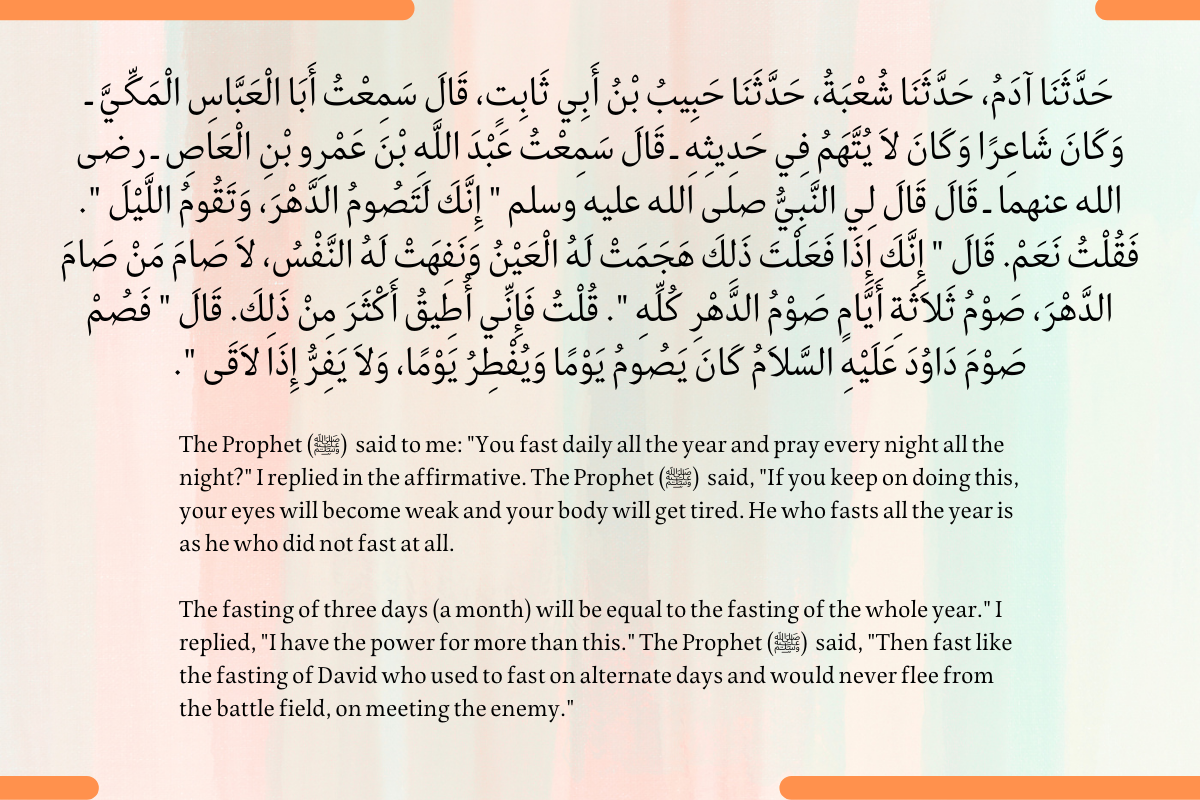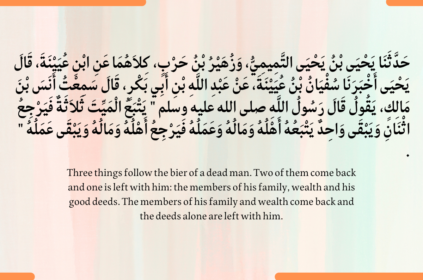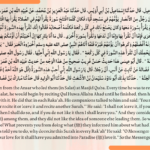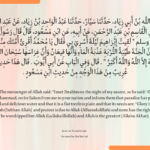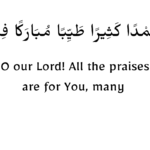- Hadith About The Best Type of Fasting and How Prophet Daud Performed It
- The Concept of Fasting in Islamic Teachings
- The Prophet Muhammad's Perspective on Fasting
- Fasting During the Month of Ramadan
- The Balance in Worship and Fasting
- Voluntary Fasts Outside Ramadan
- The Qualitative Approach to Fasting
- The Recommendation of Fasting Practices Endorsed by the Prophet
- The Ethical and Moral Dimensions of Fasting
- The Effects of Fasting on Health and Well-being
- Fasting and Spiritual Warfare
- Conclusion About The Best Type of Fasting
بِسْمِ ٱللَّٰهِ ٱلرَّحْمَٰنِ ٱلرَّحِيمِ
There’s a wealth of wisdom and guidance in the sayings and teachings of Prophet Muhammad (ﷺ), particularly when it comes to the practice of fasting.
In Sahih al-Bukhari, a collection of hadiths considered highly authentic in Sunni Islam, we find insights that emphasize the importance of moderation in fasting. The Prophet (ﷺ) warns against excessive fasting, highlighting the potential negative impact on one’s health and well-being. Instead, he advises on the virtues of periodic fasting, drawing examples from the practices of Prophet Daud (David).
This blog post will investigate into the teachings of Sahih al-Bukhari regarding the best type of fasting, shedding light on the balanced approach recommended by the Prophet Muhammad (ﷺ) for spiritual growth and physical well-being.
Hadith About The Best Type of Fasting and How Prophet Daud Performed It
حَدَّثَنَا آدَمُ، حَدَّثَنَا شُعْبَةُ، حَدَّثَنَا حَبِيبُ بْنُ أَبِي ثَابِتٍ، قَالَ سَمِعْتُ أَبَا الْعَبَّاسِ الْمَكِّيَّ ـ وَكَانَ شَاعِرًا وَكَانَ لاَ يُتَّهَمُ فِي حَدِيثِهِ ـ قَالَ سَمِعْتُ عَبْدَ اللَّهِ بْنَ عَمْرِو بْنِ الْعَاصِ ـ رضى الله عنهما ـ قَالَ قَالَ لِي النَّبِيُّ صلى الله عليه وسلم ” إِنَّكَ لَتَصُومُ الدَّهْرَ، وَتَقُومُ اللَّيْلَ ”. فَقُلْتُ نَعَمْ. قَالَ ” إِنَّكَ إِذَا فَعَلْتَ ذَلِكَ هَجَمَتْ لَهُ الْعَيْنُ وَنَفِهَتْ لَهُ النَّفْسُ، لاَ صَامَ مَنْ صَامَ الدَّهْرَ، صَوْمُ ثَلاَثَةِ أَيَّامٍ صَوْمُ الدَّهْرِ كُلِّهِ ”. قُلْتُ فَإِنِّي أُطِيقُ أَكْثَرَ مِنْ ذَلِكَ. قَالَ ” فَصُمْ صَوْمَ دَاوُدَ عَلَيْهِ السَّلاَمُ كَانَ يَصُومُ يَوْمًا وَيُفْطِرُ يَوْمًا، وَلاَ يَفِرُّ إِذَا لاَقَى ”.
The Prophet (ﷺ) said to me, “You fast daily all the year and pray every night all the night?” I replied in the affirmative. The Prophet (ﷺ) said, “If you keep on doing this, your eyes will become weak and your body will get tired. He who fasts all the year is as he who did not fast at all. The fasting of three days (a month) will be equal to the fasting of the whole year.” I replied, “I have the power for more than this.” The Prophet (ﷺ) said, “Then fast like the fasting of David who used to fast on alternate days and would never flee from the battle field, on meeting the enemy.”
Source: Sahih al-Bukhari 1979
Narrated by: ‘Abdullah bin ‘Amr
The Concept of Fasting in Islamic Teachings
Definitions and Types of Fasting
Any discussion on fasting in Islam must begin with a clear understanding of the definitions and types of fasting prescribed in Islamic teachings. Fasting is not solely abstaining from food and drink; it encompasses a more profound spiritual dimension.
There are various types of fasting observed by Muslims, including obligatory fasting during the month of Ramadan and voluntary fasting on specific days throughout the year. The table below breaks down the different types and their significance:
| Definition | Types |
| Fasting | Obligatory (Ramadan) |
| Voluntary (e.g. fasting on Mondays and Thursdays) | |
| Recommended (e.g. fasting on the 13th, 14th, and 15th of each lunar month) | |
| Compensatory (fidya for missed fasts) | |
| Supererogatory (e.g. fasting on the Day of Arafah) |
Though fasting is a physical act, its true essence lies in the spiritual benefits it offers to the individual practicing it.
The Philosophy Behind Fasting
Definitions of fasting aside, the philosophy behind fasting in Islamic teachings is rooted in self-discipline, spiritual reflection, and empathy for the less fortunate.
Fasting serves as a means to strengthen one’s devotion to God, purify the soul, and develop self-control over worldly desires.
It also fosters a sense of unity among believers as they collectively engage in this act of worship during Ramadan and other prescribed days.
Fasting as a Means of Spiritual Growth
Teachings of Prophet Muhammad emphasize the significance of fasting as a means of spiritual growth and self-improvement. Fasting not only purifies the body but also cleanses the heart and mind, leading to a deeper connection with one’s faith.
Through abstaining from physical nourishment, individuals are encouraged to focus on their spiritual well-being and cultivate virtues such as patience, gratitude, and compassion.
The Prophet Muhammad’s Perspective on Fasting
Historical Context of Fasting During the Prophet’s Time
For Prophet Muhammad, fasting held a significant place in his teachings and practices. During his time, fasting was not only a means of self-discipline but also a way to strengthen one’s relationship with Allah.
The Prophet’s Personal Practices and Fasting Habits
Habits of fasting daily and praying every night were common among some individuals during the Prophet’s time. However, Prophet Muhammad emphasized moderation, cautioning against excessive fasting.
Prophet Muhammad’s guidance regarding fasting serves as a reminder that while dedication is imperative, balance is equally important in maintaining one’s physical and spiritual well-being.
Sayings of the Prophet About Fasting
Perspective on fasting according to Sahih al-Bukhari reveals the Prophet’s teachings on fasting. He highlighted the importance of moderation and advised against excessive fasting, stating that fasting three days a month could be as rewarding as fasting the entire year. These sayings provide valuable insights into the Prophet’s perspective on fasting and serve as a guide for Muslims seeking spiritual growth.

Fasting During the Month of Ramadan
The Importance of Ramadan in the Islamic Calendar
Despite the significance of fasting throughout the year, Ramadan holds a special place in the Islamic calendar as the month of fasting prescribed by Allah. It is a time when Muslims all over the world unite in worship, reflection, and spiritual growth.
Exceptions and Flexibility in Ramadan Fasting
During Ramadan, there are exceptions and allowances made for individuals who may face difficulty in fasting, such as the elderly, sick, pregnant, and breastfeeding women. Islamic teachings emphasize the importance of prioritizing health and well-being, allowing for flexibility in the practice of fasting.
Guidance from Islamic scholars highlights that while fasting is encouraged, it is also important to consider one’s physical condition and make informed decisions about fasting based on individual circumstances.
The Spiritual and Community Aspects of Ramadan
For Muslims, Ramadan is not only about abstaining from food and drink but also a time for spiritual reflection, self-discipline, and community bonding. The collective experience of fasting during Ramadan fosters a sense of unity and empathy among believers, reinforcing the values of compassion, generosity, and solidarity.
During Ramadan, Muslims are encouraged to engage in acts of charity, seeking forgiveness, and strengthening their connection with Allah through increased prayer and reflection. The spiritual and communal aspects of Ramadan serve to deepen the sense of brotherhood and shared purpose within the Muslim community.
The Balance in Worship and Fasting
The Prophet’s Advice Against Excessive Fasting
For the sake of maintaining a healthy balance in worship, Prophet Muhammad (ﷺ) advised against excessive fasting. In Sahih al-Bukhari, it is narrated that the Prophet warned a companion who was fasting daily and praying every night that such extreme practices could lead to weakened eyesight and fatigue.
The Prophet emphasized the importance of moderation in worship and fasting to prevent physical harm and maintain a sustainable spiritual practice.
Moderation and Its Role in Islamic Worship
To ensure a balanced approach to worship, moderation plays a crucial role in Islamic teachings. Prophet Muhammad (ﷺ) encouraged the companions to avoid extremes in devotion and fasting, highlighting the importance of moderation to maintain physical and spiritual well-being. By finding a middle ground in worship practices, believers can honor their religious duties while safeguarding their health and vitality.
Achieving Balance in Fasting Practices
Practices such as fasting offer a spiritual opportunity for self-discipline and reflection, but it is imperative to strike a balance in one’s fasting routine. Following the example of Prophet Daud, who fasted on alternate days, can serve as a model for achieving moderation and balance in fasting practices.
By incorporating intermittent fasting patterns, believers can maintain a sustainable and healthy approach to fasting throughout the year.
Understanding the wisdom behind moderation in worship and fasting teachings can guide believers in navigating their spiritual journey with mindfulness and balance. By heeding the Prophet’s advice on avoiding extreme practices and embracing moderation in worship, believers can cultivate a harmonious relationship between their faith and physical well-being.
Voluntary Fasts Outside Ramadan
Significance of Fasting on Special Days
For those seeking additional reward through voluntary fasting, Prophet Muhammad (ﷺ) highlighted the importance of fasting on special days such as Ashura and Arafat.
Narrations in Sahih al-Bukhari emphasize the spiritual significance of these days, wherein fasting is believed to bring about forgiveness of sins and increased piety.
The Prophet’s teachings, as in the hadith about fasting three days a month being equal to fasting the whole year, underline the accessibility of these opportunities for spiritual growth.
The Encouraged Practice of Fasting Six Days of Shawal
Muslims are encouraged to fast six days in the month of Shawal. This practice carries substantial rewards, as the Hadith mentions that fasting these days is equivalent to fasting the entire year.
The voluntary nature of this fast provides believers with an opportunity to continue reaping spiritual benefits beyond the blessed month of Ramadan.
The Qualitative Approach to Fasting
The Prophet’s Emphasis on Sincerity and Intention
Approach the act of fasting with a sincere heart and pure intentions, following the example set by Prophet Daud in fasting on alternate days. The Prophet Muhammad (ﷺ) highlighted the importance of consistency and intention in acts of worship, emphasizing that true devotion goes beyond the physical act to the purity of the heart and soul.
Rewards for Consistent and Meaningful Fasting
Worshiping with sincerity and intention brings about immense rewards, as mentioned in Sahih al-Bukhari. The Prophet Muhammad (ﷺ) pointed out that fasting for just three days a month with dedication and sincerity can be equivalent to fasting the entire year.
It is not about the quantity of fasting but the quality and intention behind it that truly holds significance in the eyes of Allah.
The Recommendation of Fasting Practices Endorsed by the Prophet
The Recommendation of Fasting Three Days per Month
Three days of fasting per month, as advised by the Prophet Muhammad (ﷺ), holds great significance in the practice of fasting. The Prophet emphasized that fasting for three days a month is equivalent to fasting for the entire year.
This practice not only carries spiritual benefits but also helps in maintaining a balanced approach towards fasting, preventing excessive strain on the body.
Following the Fasting Tradition of Prophet Daud
With the example of Prophet Daud in mind, fasting on alternate days is advocated by the Prophet (ﷺ) as a means to enhance the spiritual and physical well-being of individuals.
This tradition not only promotes moderation in fasting but also encourages believers to maintain their strength and readiness for any challenges they may face.
Adapting the Intensity of Fasting to Individual Capabilities
Intensity in fasting should be tailored to each individual’s capabilities, just as exemplified by the Prophet Muhammad (ﷺ).
It is important to recognize one’s physical limitations and adapt the fasting practices accordingly, ensuring that one strikes a balance between spiritual devotion and self-care.
By following this approach, individuals can derive the maximum benefit from fasting while safeguarding their health.
The Ethical and Moral Dimensions of Fasting
Fasting and its Impact on Moral Conduct
Impact of fasting extends beyond physical benefits; it plays a significant role in shaping one’s moral conduct. As narrated by Sahih al-Bukhari, Prophet Muhammad advised moderation in fasting to prevent exhaustion which may hinder one’s ability to maintain good morals.
The Prophet’s Emphasis on Compassion and Charity While Fasting
Fasting, according to the teachings of the Prophet Muhammad, is not just about abstaining from food and drink. It also involves demonstrating compassion and charity towards others, especially those in need.
The Prophet emphasized the importance of helping the less fortunate while fasting, highlighting the connection between empathy and the practice of fasting.
Fasting as a Means of Social Solidarity and Empathy for the Poor
For Prophet Muhammad, fasting was not only a personal act of worship but also a means to promote social solidarity and empathy for the poor. By experiencing hunger and thirst during fasting, individuals develop a deeper understanding of the struggles faced by the less privileged in society.
This fosters a sense of empathy and solidarity, encouraging people to help those in need and create a more compassionate community.
The Effects of Fasting on Health and Well-being
Physical Benefits of Fasting as Mentioned in Hadith
Well-being is a crucial aspect of fasting, as emphasized by Prophet Muhammad in Sahih al-Bukhari. The Prophet warned against excessive fasting, recommending moderation for the sake of one’s health.
He highlighted the importance of balance and advised that three days of fasting each month is equivalent to fasting the entire year. This moderation not only prevents physical fatigue but also benefits overall health.
The Prophet’s Attention to Health and Nutrition
Any discussion on fasting would be incomplete without acknowledging the Prophet’s keen focus on health and nutrition. Prophet Muhammad’s teachings emphasize the significance of maintaining a healthy lifestyle while fasting. His advice on fasting intermittently and prioritizing well-rounded nutrition demonstrates a holistic approach towards well-being.
The Integration of Fasting into a Healthy Lifestyle
Health should be a priority when integrating fasting into one’s lifestyle. Prophet Muhammad’s teachings highlight the importance of incorporating fasting into a broader healthy living regimen.
This integration involves not only observing fasts but also paying attention to nutrition, physical activity, and overall well-being. By following the Prophet’s guidance, individuals can reap the benefits of fasting while maintaining optimal health.
Fasting and Spiritual Warfare
The Metaphor of the Battlefield and Fasting
One of the teachings of Prophet Muhammad (ﷺ) regarding fasting is the metaphor of spiritual warfare. Just as a soldier must maintain balance and strategic planning in battle, a believer should not overexert themselves with excessive fasting that may result in physical weakness. The Prophet’s analogy emphasizes the importance of moderation and consistency in spiritual practices.
The Role of Fasting in Strengthening Faith
Fasting not only serves as a physical act of self-discipline but also plays a significant role in strengthening one’s faith. As narrated in Sahih al-Bukhari, Prophet Muhammad (ﷺ) highlighted the virtues of periodic fasting over continual fasting, as it allows for a balance between spiritual devotion and physical well-being. This approach ensures that one’s faith remains steadfast and unwavering.
Fasting as a Shield Against Negative Temptations
Temptations can often lead individuals astray from their spiritual path. In the context of fasting, the act serves as a shield against negative influences and temptations.
By practicing self-restraint and discipline through fasting, believers fortify themselves against worldly distractions, allowing for a deeper connection with their faith and spiritual growth.
Conclusion About The Best Type of Fasting
Now, as we reflect on the teachings of Prophet Muhammad (ﷺ) regarding fasting, we are reminded of the balance and moderation that he emphasized. The Prophet’s wise words to a companion caution against excessive fasting, highlighting the significance of maintaining good health and strength while practicing this act of worship.
By recommending the fasting of three days a month as equivalent to fasting the whole year, and pointing to the example of Prophet Daud’s alternate fasting, the Prophet (ﷺ) shows us the importance of moderation and sustainability in our religious practices.
Let us heed his teachings and strive to emulate his example, finding the perfect balance in our devotion and physical well-being.
As always, do share this piece of article out to all of your family and friends. Remember to practice moderation in fasting and any other type of worship. May it be one of the long lasting good deeds that rewards us well. Here in this world and in the hereafter, InsyaAllah.
